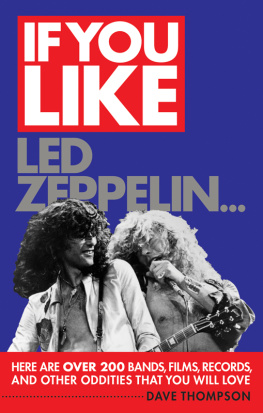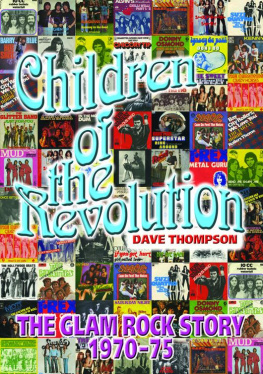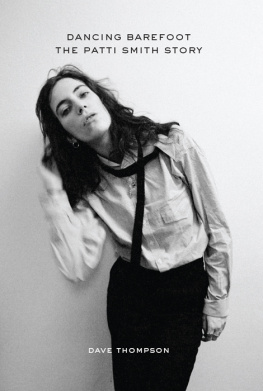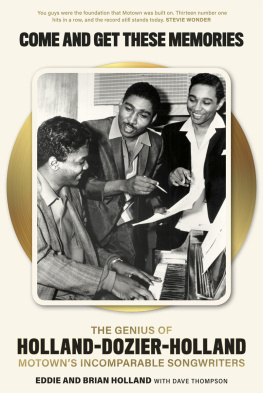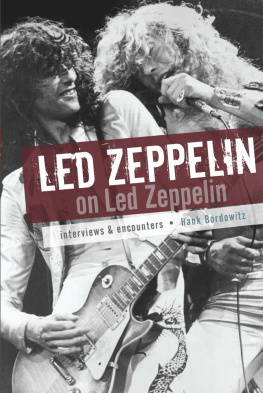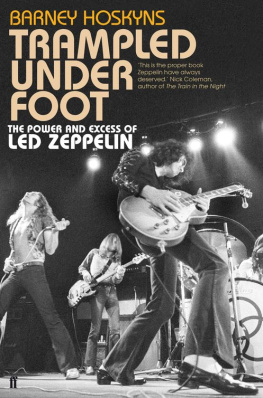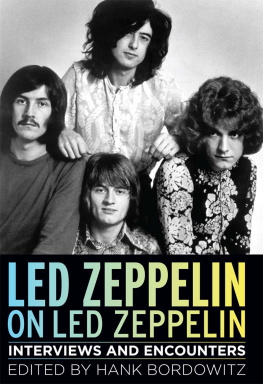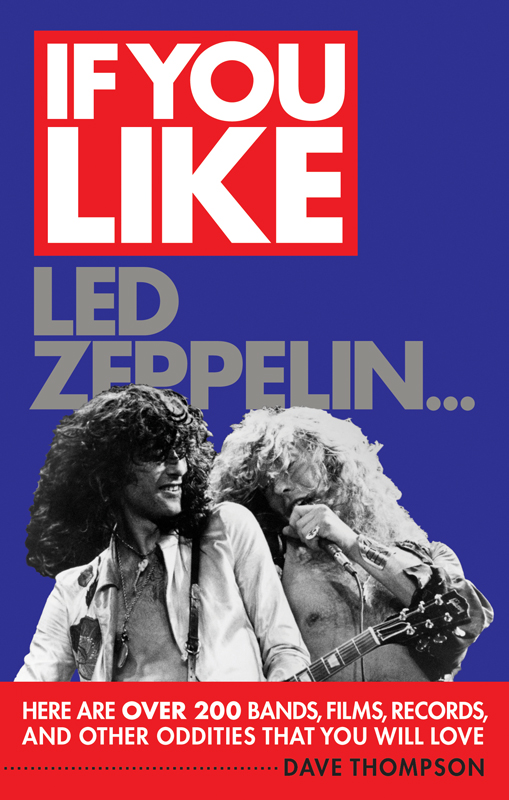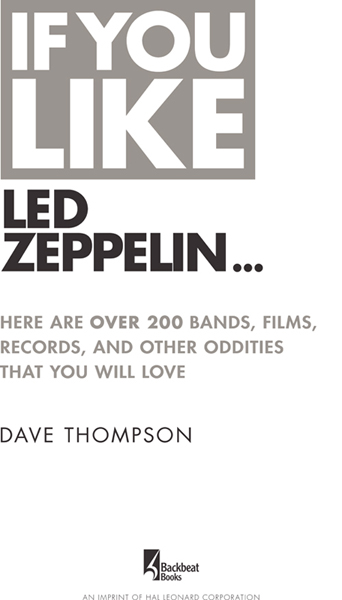All rights reserved. No part of this book may be reproduced in any form, without written permission, except by a newspaper or magazine reviewer who wishes to quote brief passages in connection with a review.
Thompson, Dave, 1960 Jan. 3
If you like Led Zeppelin: here are over 200 bands, films, records, and other oddities that you will love / Dave Thompson.
p. cm.
Includes bibliographical references.
1. Led Zeppelin (Musical group) 2. Rock musicians--England. 3. Rock music--History and criticism. I. Title.
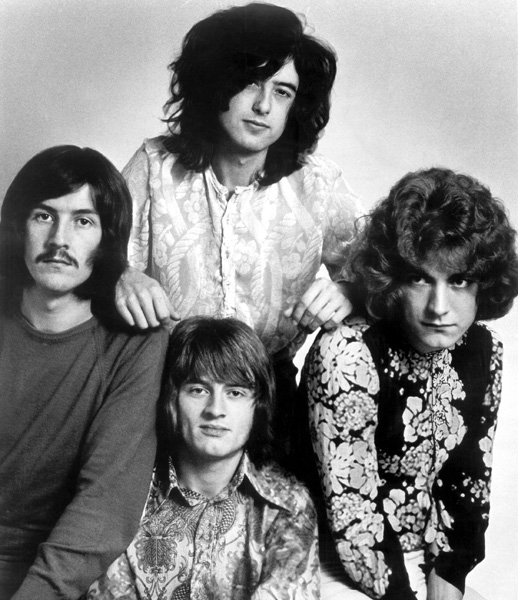
Led Zeppelin, circa 1969. Clockwise from front center: John Paul Jones, John Bonham, Jimmy Page, and Robert Plant. (Photofest)
Introduction
To rock fans of a certain age, there are certain intros that need no further introduction.
Der-neh-der-neh-NEH (der-der-dum der-der-dum)
Ner-ner-ner-ner-ner-ner-ner-nerDEH-DEH-DEH
De-de-de de-dii-de-de
Okay, that last ones trickier. But if you got even one out of the three, chances are you could attempt to phoneticize a whole bunch more, and gaze in pitying astonishment at anyone who wasnt as instantly au fait as you are.
Aaaaah-ehhhh-aaaaaaaaaaaUH!
Across a lifetime that spanned thirteen years, nine LPs, one double live set, and a posthumous compilation, and which has only sporadically been added to since then, Led Zeppelin recorded and released just eighty-five songs. Yet those eighty-five not only set the bar for every rock band of their generation, they became the benchmark for every band that followed.
Between the fall of 1968, when they arose from the ashes of the Yardbirds and taped their first album in a matter of days, and September 1980, when the death of drummer John Bonham rang down the curtain on their career, Led Zeppelin did not simply establish themselves as the biggest rock band in the world. They grasped that throne for all time, because, no matter how successful the groups of the past three decades have beenno matter how readily the financial, attendance, and sales records Zeppelin once set might be smashednot one of those record-breakers has even threatened to match the sheer weight of influence that Bonham, Jimmy Page, Robert Plant, and John Paul Jones exerted on their surroundings.
No, Bono, not even you.
This is not the place to ponder the reasons why; to analyze the fortuitous confluence of musical streams and strains that Zeppelin, alone of the massive pack plowing the fertile valleys of late-sixties rock, was able to seize upon; to consider the sheer bravado with which manager Peter Grant set about building the legend of a band that wasnt simply untried, but completely unknown; or to pick apart the monstrous marketing machine that allowed Zeppelin to crush all opposition and reinvent rock in their own image.
The fact is, they achieved it and, even more remarkably, they did so by eschewing almost every one of the shortcuts other bands have relied upon. For as long as there had been rock n roll, a hit single was the way to break into the mainstream, and even those late-sixties rockers who claimed to despise the things were not immune to the advantages a smash 45 could bring. Vanilla Fudge, Black Sabbath, Deep Purple, Emerson, Lake & Palmer, Yes, Hawkwind, Argent, bands whose very raison dtre was built around the long-playing statementthey all scored hit singles, and their profiles rose accordingly.
Not Led Zeppelin. Throughout most of the world, they did not even issue singles and, while their American label, Atlantic, did insist on sneaking the 45s out (and scored hits with them), they did so in the knowledge that the band would not be promoting them.
Because that was the other shortcut Led Zeppelin avoided. They would not appear on television, not after a handful of performances early on in their career left the musicians bored and frustrated with the demands of the medium. Led Zeppelin was a live band; therefore, Led Zeppelin would play live. And if you wanted to see them, you had to catch them live as well.
And theres more. Throughout the sixties and seventies, the primary conduit between artist and fan was the music press, a printed medium that devoured several rain forests worth of trees every month to fill the average fans appetite for hot news and info. In Zeppelins British homeland through much of that period, there were no fewer than five music papers appearing every week (Melody Maker, New Musical Express, Sounds, and Record Mirror, plus shorter-lived enterprises like Disc and the appallingly titled National Rock Star). There was the biweekly Street Life and a slew of monthlies too. Plus an ever-changing roster of magazines dedicated to the teenybop market.
The United States had less to choose from, but the best of the bunch remain legends to this dayCreem, Circus, Rolling Stone (in the days when its music coverage came first and was generally better than anyone elses). All sold by the bucket-load, all were savagely independent, and all were essential reading. A front-page story in any one of those was worth a gold disc before the new album was even released.
Led Zeppelin ignored them. Not completely, and certainly not exclusively. But interviews with the band were nevertheless at a premium, as manager Peter Grant laid out an unspoken dictate that flew in the face of all commercial common sense. Yes, you could talk about the band as much as you liked. But youd be very, very lucky if you got to talk to them.
Any one of these dictates could easily have backfired. The press could have turned against the band, the record buyers could have shrugged with disinterest, the couch potatoes could have remained on the couch.
But they didnt, because Led Zeppelin had one thing no other band of the age could come close to possessing. It was called mystique, and that is so unquantifiable that, again, we will not even try. Put simply, however, people trusted Led Zeppelin.
Trusted them to make a great album without wanting to hear a three-minute snippet before they laid down their cash.
Trusted them to put on a great show, without needing to catch a sanitized highlight on American Bandstand.
And trusted them to have something to say, without having to wade through three thousand words of edited conversation in search of John Bonhams thoughts on the Nixon administration.
But there was something else that made Led Zeppelin special, that raised them above the hue and cry of the rest of the rock pack, and established them on a musical plateau thatagainhas never been scaled by anyone else. And that was their openness to influence, their willingness to listen, and their ability to seamlessly assimilate so many personal fascinations into what became a very public whole.

